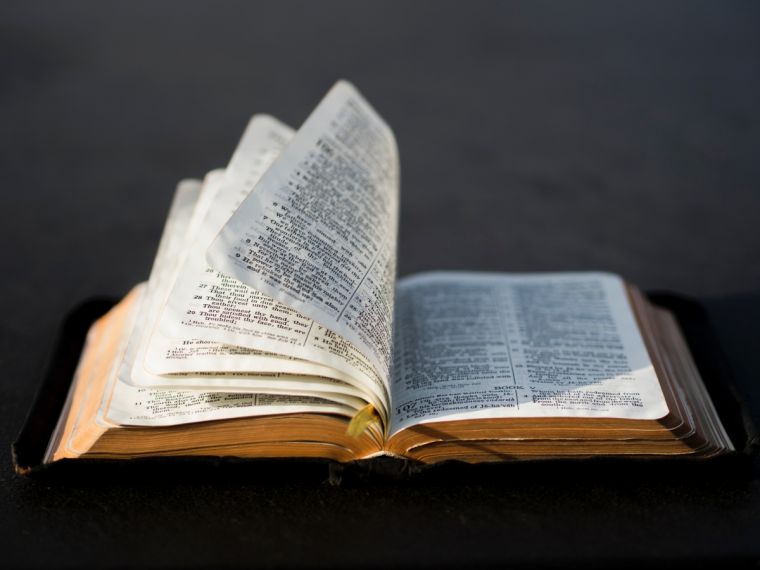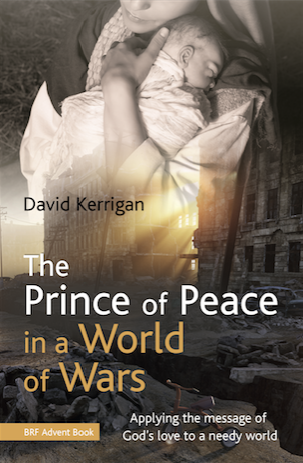Advent reading: The wobble at the heart of the world
BRF's Advent book of daily readings for 2018 is 'The Prince of Peace in a World of Wars', by Rev David Kerrigan, formerly general director of BMS World Mission. This is an extract used with permission.
Shalom and the Cross of Christ
He is the image of the invisible God, the firstborn of all creation; for in him all things in heaven and on earth were created, things visible and invisible, whether thrones or dominions or rulers or powers – all things have been created through him and for him. He himself is before all things, and in him all things hold together. He is the head of the body, the church; he is the beginning, the firstborn from the dead, so that he might come to have first place in everything. For in him all the fullness of God was pleased to dwell, and through him God was pleased to reconcile to himself all things, whether on earth or in heaven, by making peace through the blood of his cross (Colossians 1:15–20).
You may have noticed by now that there is both a subjective and an objective dimension to this thing we have called peace. Subjectively, it can be how we feel or don't feel. The events of everyday life produce circumstances whereby we feel we have or feel we lack the peace we desire. Objectively, the Bible also speaks of peace in a different way. In today's passage, there is no reference to how we feel; rather there is a bold statement that through Christ God made peace with 'all things... through the blood of his cross' (verse 20). We need to understand what is being said here.

This passage is one of the high peaks of scripture. It addresses in magisterial terms the greatness and uniqueness of Christ. With echoes of other biblical texts, we are told that Christ is the image of the invisible God (verse 15 and Hebrews 1:3), that everything was created by him and for him (verse 16 and John 1:3), that he was before time began (verse 18 and John 17:5), that he sustains all things (verse 17 and Hebrews 1:3) and that he has first place in everything (verse 18 and 1 Corinthians 8:6). What is unmistakable and undeniable is the absolute exaltation of Jesus. He is high and lifted up, worthy of all honour and praise.
But verse 20 reminds us that Jesus came in the flesh for a purpose, and the purpose was not simply to make us feel better – at least not in the direct sense we might mean. For example, if the passage said all the above about Jesus but then closed by saying that he lived a long and holy life and died in old age in his home in Nazareth, it would offer me some solace that he knew what it meant to live our kind of life and knew the kind of problems that come to us, but apart from added inspiration, nothing has really changed.
What did change is alluded to in verse 20: God our Father, through Jesus his Son, our Saviour, reconciled 'all things... by making peace through the blood of his cross'. Take your minds back to the Passover night we discussed on 2 December, and Jesus' assertion that he had to leave his disciples (John 16:6–7). The compulsion to leave was not a desire to part company from them, but 'he set his face to go to Jerusalem' (Luke 9:51) because the hour had come 'for the Son of Man to be glorified' (John 12:23). Here then is the heart of what it means to engage with the peace that surpasses all understanding. It is an objective peace – something that has been made possible solely by the intervention of God. Something was changed that has altered the relationship between God and humankind.
Some years ago, I attended a circus. While the lions and tigers were impressive, the clowns funny and the trapeze artists unbelievably brave, it was a plate-spinning act that I remember best. It was funny and clever and as engaging as any other performance that day. When the plates were spinning level, all was well, but the moment they started to wobble, the audience screamed and gesticulated to tell the spinner where to go next.
That image of the plate wobbling is one of my abiding images of what the Bible calls sin. The wobble may be small, or it may be catastrophic, but you can tell immediately that it's not on the level. The only thing that can correct the situation is the intervention of the plate spinner to bring things back to right.
Now there is a flaw in most illustrations, so don't stretch this beyond its limit. The thing is, the whole of creation has wobbled since the intrusion of sin. Today we still struggle with understanding what that means, but we look around and we sure don't have to struggle to understand the reality of it. Even on our good days, our purest motivations, our kindest deeds are at best but fleeting moments, at worst tainted by disordered motivation.
We have seen that from the outset God's wonderful creation fell into a state of rebellion by the defiance of those he created and to whom he gave free will. Somewhere and somehow, in the unseen order of things that embraces our human lives, the lives of animals and even the physical universe itself, life became out of sync with God.
Imagine the cumulative effect of these countless wobbles. Lives hurting, broken and stunted; violence and rebellion; abuse and disuse; relationships twisted; sickness and pain; accidents and tragedy; depression and self-loathing; hatred and fighting; battles and wars; death and dying. Taken together they comprise an insurmountable barrier between God and ourselves. They rob us of any opportunity to enjoy the presence of God.
But the news is good, not bad, because God has acted and in Christ he has made peace by his death on the cross. You see, every wobbling plate, left alone, will crash to the floor and smash into pieces. That is the death that is the natural consequence of our disordered lives. Not all is bad, of course not, but objectively we are separated from God, who is infinitely holy. It is because of this that Jesus enters our human experience to take on to himself all that is laid upon us.

Romans 5:12–21 expresses this well, and this is where our gospel has huge coherence. Jesus was sinless and so did not deserve to die. That cannot be said of anyone else. But as the innocent one, he died on our behalf, and in that act of dying he took the sin of the world into himself and took them down into death.
We cannot plumb the depths of understanding required to make sense of how that 'death of death' took place, but we do know that if the cross and resurrection of Jesus means anything, it will be the diametric opposite of the sum total of human wretchedness that sits on the other side of the scales.
Christ's resurrection was the evidence that death itself had been destroyed and peace was now, at last, possible. One day it will be wholly realised, but for now a foretaste is possible. In Romans 5:1 we read, 'Therefore, since we are justified by faith, we have peace with God through our Lord Jesus Christ', and in John 10:10 we read the words of Jesus, 'I came that they may have life, and have it abundantly.'
Peace is possible now, in this life, through a living faith relationship with God. And over the coming days I want us to see how God's people have been able to search out that peace for themselves, even in the midst of many trials.
'The Prince of Peace in a World of Wars' by David Kerrigan is published by BRF, price £8.99.











